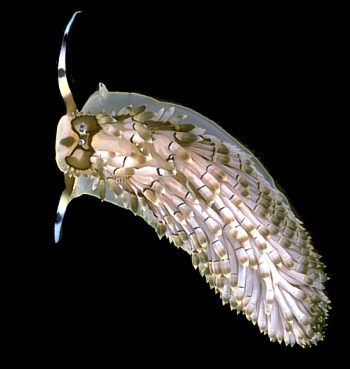
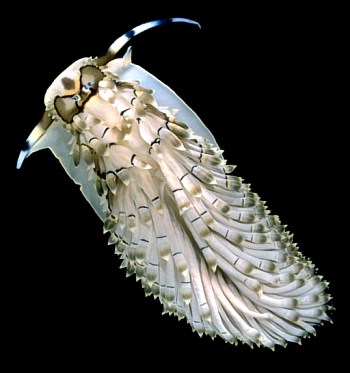
Cerberilla affinis
Bergh, 1888
Order: NUDIBRANCHIA
Suborder: AEOLIDINA
Family: Aeolidiidae
PHOTO
Lord Howe Is, off New South Wales, Australia, December 1988. 70mm long alive. PHOTOS: Bill Rudman.
Species of Cerberilla live in sandy substrates where they burrow beneath the surface and so are seldom seen. They have a very broad foot and the cerata are often very long and extremely numerous, arranged in transverse rows across the body.
Cerberilla affinis was originally described from Indonesia. It is also known from Lord Howe Island, the eastern Australian mainland and New Caledonia and is probably widespread in at least the West Pacific. Two species from the Indian Ocean, C. africana Eliot, 1903b (East Africa) and C. moebii (Bergh, 1888b - Mauritius) are very similar in colour and may prove to be synonymous. Unfortunately most species have been described from single specimens, and so the colour variability of species is not well understood.
See Cerberilla sp. 2. which may be a juvenile.
- Bergh, L.S.R. (1888). Beiträge zur Kenntniss der Aeolidiaden. IX. Verhandlungen der koniglich-kaiserlich Zoologisch-botanischen Gesellschaft in Wien (Abhandlungen), 38: 673-706, Pls. 16-20.
Rudman, W.B., 1999 (November 25) Cerberilla affinis Bergh, 1888. [In] Sea Slug Forum. Australian Museum, Sydney. Available from http://www.seaslugforum.net/find/cerbaffi
Related messages
Cerberilla affinis from sthn Queensland
April 29, 2006
From: Bruce Wilkie

Hi Bill,
Found this animal crawling around amongst shell and coral rubble recently.
My first thought was maybe it is Cuthona yamasui but now I think it is Cerberilla affinis
Locality: Shag Rock, Point Lookout, North Stradbroke Island., 11metres, Queensland Australia, Pacific ocean, 25 April 2006, rocky reef with sponges, hard & soft corals . Length: 45mm. Photographer: Bruce Wilkie.
Could you please confirm.
Many thanks,
Bruce Wilkie.
brucedwilkie@yahoo.com.au



Dear Bruce,
Yes this is Cerberilla affinis. I am not surprised you considered it might be Cuthona yamasui because that species looks quite like a member of the family Aeolidiidae. In fact when I first found Cuthona yamasui I thought it was a strange hydroid feeding member of that family until I had a look at its anatomy.
Best wishes,
Bill Rudman
Cerberilla affinis from Fairy Bower
February 22, 2006
From: Les Schumer

Hi Bill,
I spotted this guy at Fairy Bower and thought you may be interested in the colouration. It's a fair bit more colourful than other examples of the species i've seen to date.
Locality: Fairy Bower (near Manly), Sydney, 3 metres, New South Wales, Australia, 7 February 2006, Sandy bed near rocks. Length: 50 mm. Photographer: Les Schumer.
Thanks for the great site!
Les
LSchumer@Chartres.com.au
Schumer, L.J., 2006 (Feb 22) Cerberilla affinis from Fairy Bower. [Message in] Sea Slug Forum. Australian Museum, Sydney. Available from http://www.seaslugforum.net/find/15914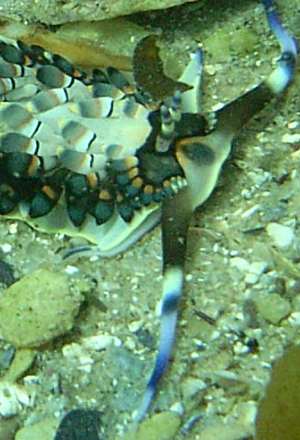
Dear Les,
Thanks for the photo. I am not sure from your message whether you mean you see it quite often or you've seen it in photos. Species of Cerberilla are not that often seen because they usually burrow in the sand. If you do see it now and again it would be nice to find out what it is eating. I guess it is eating a sea anemone of some sort but we don't know what sort and we don't know if they eat them on the surface or sneakily attack from beneath the sand.
Best wishes,
Bill Rudman
Cerberilla affinis from Reunion Island
February 14, 2005
From: Philibert Bidgrain

Dear Bill,
Reunion Island sea slugs.
We have only one specimen of Cerberilla affinis, observed by Maurice Jay in "Mare de Baramine" in a permanant pool in interdidal area
at Saint Paul, Reunion Island. A few years ago...
Best Regards
Philibert Bidgrain
http://vieoceane.free.fr/runseaslug/indexslug.htm
pbidgrain@yahoo.fr
Bidgrain, P., 2005 (Feb 14) Cerberilla affinis from Reunion Island. [Message in] Sea Slug Forum. Australian Museum, Sydney. Available from http://www.seaslugforum.net/find/13104Dear Philibert,
I would call this Cerberilla affinis Bergh, 1880. As I discuss on the species Fact Sheet, two other species from the Indian Ocean, C. africana Eliot, 1903b (East Africa) and C. moebii (Bergh, 1888b - Mauritius) may be synonyms, but we don't know enough about them at present.
Best wishes,
Bill Rudman
Cerberilla? from the Philippines
November 29, 2002
From: Erwin Köhler
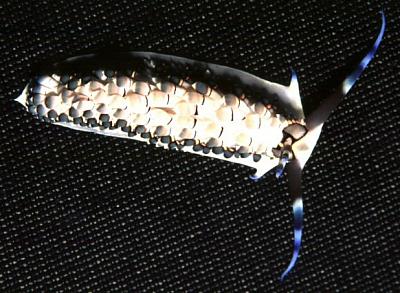
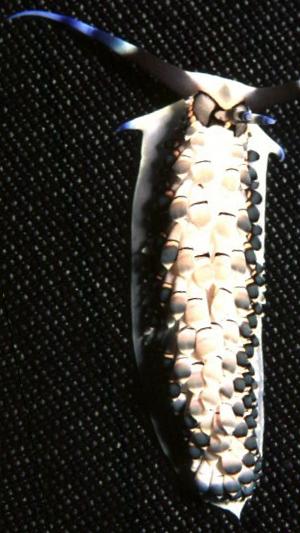
Dear Bill,
Here is one more picture from Georg Heinze (Georg.Heinze@t-online.de)from the Philippines, Cabilao Island, Divesite "Lighthouse"
The shot was done on a wet-suit, but the specimen was found on sandy ground.
Size: 25mm
Depth: 8m
May 2002
Erwin
erwin@medslugs.de
Köhler, E., 2002 (Nov 29) Cerberilla? from the Philippines. [Message in] Sea Slug Forum. Australian Museum, Sydney. Available from http://www.seaslugforum.net/find/8534Thanks Erwin,
I am pretty sure this is a half-grown Cerberilla affinis. If you compare it with photos of adults and the photo of Cerberilla sp. 2, which I think is a juvenile of
Best wishes,
Bill Rudman
Cerberilla affinis from Heron Island
May 25, 2001
From: Julie Marshall
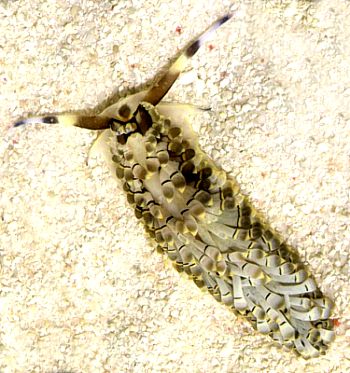
Dear Bill,
Attached are two photos to add to your Cerberilla affinis page. The upper photo shows the animal at rest with the long cerata lying flat and pointing backwards. When Cerberilla affinis is disturbed the longest cerata are extended and they writhe about as in the lower right photo. This animal was 45 mm in size and was found on the sand in the early morning.
Best wishes,
Julie Marshall
j.marshall@latrobe.edu.au
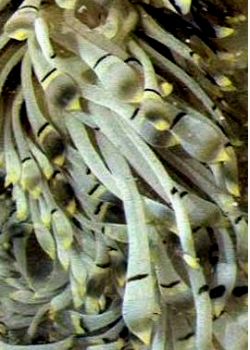
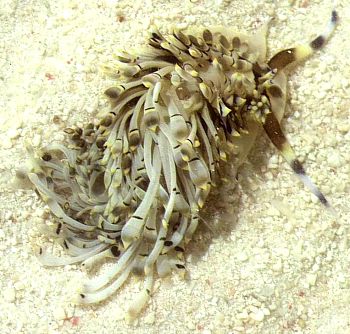
Dear Julie,
I've added a closeup of some of the cerata. They are amazing animals. I would love to see them feeding on the sand-dwelling sea-anemones which are assumed to be their food. Has anyone any photos or feeding observations on any species of Cerberilla?
Best wishes,
Bill Rudman
